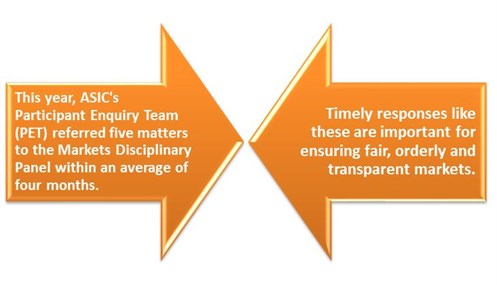Market Integrity Update - Issue 67 - December 2015
Edition 67, December 2015
- End of year 'window dressing'
- Fees and costs disclosure
- Issuing simple corporate bonds
- NTA requirements for retail OTC derivatives issuers
- Authorised representatives may not issue financial products
- Healthzone director jailed for market manipulation
- MECS: Tip of the month
- Markets articles by ASIC
- Stories from the beat
End of year 'window dressing'
 The end of the year can be associated with an increase in unusual trading activity. During this period, we see orders placed at or near the close of trading which disproportionately affects share prices. This is known as 'window dressing'.
The end of the year can be associated with an increase in unusual trading activity. During this period, we see orders placed at or near the close of trading which disproportionately affects share prices. This is known as 'window dressing'.
Window dressing is a form of market manipulation and can affect share price valuations and end of financial year performance figures. It is generally conducted by individuals who have an incentive to manipulate prices in or near reporting periods, such as those who periodically report to clients about investment performance.
We will be monitoring any trading that increases prices near the end of reporting periods, and which may be indicative of market manipulation.
Participants and crossing system operators should also be taking steps to identify possible misconduct, through system controls and filters and reviews of anomalous trading by designated trading representatives and compliance staff. You must notify ASIC if you suspect market misconduct.
Fees and costs disclosure
 We have updated our guidance on fees and costs disclosure for issuers of superannuation and managed investment products to retail clients. We have also amended the regulations which clarify the requirements for disclosing fees and costs.
We have updated our guidance on fees and costs disclosure for issuers of superannuation and managed investment products to retail clients. We have also amended the regulations which clarify the requirements for disclosing fees and costs.
Issuers of superannuation and managed investment products are required to disclose fees and costs for their products in product disclosure statements (PDSs), under the Corporations Regulations 2001. Providing accurate and consistent disclosure is important for consumers who are making decisions about their superannuation and managed investments.
In 2014, ASIC reviewed fees and cost disclosure practices for superannuation and managed investment products. We identified inconsistencies and under-disclosure of fees and costs by issuers of these products. Our observations are published in Report 398 Fee and cost disclosure: Superannuation and managed investment products (REP 398).
A key focus of the current changes is the disclosure of indirect costs, including costs of investing through interposed vehicles. Some information in Regulatory Guide 97 Disclosing fees and costs in PDSs and periodic statements (RG 97) is also relevant to issuers of investment life insurance products and operators of investor-directed portfolio services.
We continue to encourage industry to develop standards that complement our guidance. For example, by providing guidelines in respect of particular product types, such as platforms and private equity products.
To assist trustees and responsible entities to prepare their systems and procedures for the changes to fees and costs disclosure requirements, a transition period will apply until 1 February 2017.
Issuing simple corporate bonds
 Australian Unity, an ASX-listed health insurer and mutual fund, recently launched Australia’s first offer of simple corporate bonds to retail investors under new legislation. Prospective issuers should ensure they understand changes to the requirements for issuing simple corporate bonds.
Australian Unity, an ASX-listed health insurer and mutual fund, recently launched Australia’s first offer of simple corporate bonds to retail investors under new legislation. Prospective issuers should ensure they understand changes to the requirements for issuing simple corporate bonds.
The legislation (which forms part of the Corporations Act 2001 (Corporations Act)) was introduced in December 2014. It is designed to encourage the issue of corporate bonds and establish a strong and liquid retail debt market in Australia while ensuring that consumer protections are maintained.
The legislation includes simplified and streamlined disclosure requirements. These requirements obligate issuers to prepare a two-part prospectus which contains information that is relevant to retail investors who are considering whether or not to invest in simple corporate bonds.
In particular, issuers must disclose prescribed financial ratios (including the interest cover ratio and gearing ratio) for simple corporate bonds. Investors need this information to evaluate issuers' ability to meet their obligations under the bonds. We will monitor whether the prescribed ratios are clearly disclosed in prospectus documents.
The legislation also permits use of incorporation by reference to the prescribed information. This is intended to facilitate streamlined disclosure and assist issuers to prepare prospectuses focused on key information that is useful for retail investors.
- Find out more about investing in corporate bonds
- Read the Corporations Amendment (Simple Corporate Bonds and Other Measures) Act 2014
NTA requirements for retail OTC derivatives issuers
 Retail over-the-counter (OTC) derivatives issuers licenced by ASIC must hold 50% of their net tangible assets (NTA) in cash or cash equivalents and 50% in liquid assets.
Retail over-the-counter (OTC) derivatives issuers licenced by ASIC must hold 50% of their net tangible assets (NTA) in cash or cash equivalents and 50% in liquid assets.
Funds held as collateral against derivative contracts (or otherwise used for hedging purposes) should not be included in the calculation of 'cash and cash equivalents'. This is because those funds are subject to encumbrances and are at significant risk of changes in market value.
The NTA requirements for retail OTC derivative issuers are critical to ensuring that licensees can manage the risk of financial loss and, if a licensee is wound up, that there is a buffer to assist with an orderly and compliant winding up of their business.
We encourage retail OTC derivatives issuers to review their existing arrangements and ensure they are meeting their financial resource obligations. If you are unsure of your specific financial requirements, we recommend that you seek professional advice. For example, funds held as collateral against derivative contracts to meet the NTA requirements may put you in breach of the financial requirements of your Australian financial services (AFS) licence.
Authorised representatives may not issue financial products
 Authorised representatives can only provide a specified financial service on behalf of an AFS licensee. They cannot issue products on their own behalf.
Authorised representatives can only provide a specified financial service on behalf of an AFS licensee. They cannot issue products on their own behalf.
Authorised representatives who issue financial products expose themselves to an action for unlicensed conduct. Authorised representatives that falsely market themselves as 'product issuers' may face regulatory action for misleading and deceptive conduct.
In addition, AFS licensees that allow their authorised representatives to engage in this conduct may face regulatory action for failing to adequately supervise their representatives.
Industry participants need to be clear on the limitations of using a corporate authorised representative business model.
Healthzone director jailed for market manipulation
 Following an ASIC investigation, Mr Robert Dulhunty, a former director of Healthzone Limited (Healthzone), has been sentenced to 18 months imprisonment for conspiring to manipulate the share price of Healthzone between 1 May 2007 and 12 December 2010.
Following an ASIC investigation, Mr Robert Dulhunty, a former director of Healthzone Limited (Healthzone), has been sentenced to 18 months imprisonment for conspiring to manipulate the share price of Healthzone between 1 May 2007 and 12 December 2010.
Mr Dulhunty was a director of Healthzone between 4 May 2007 and 27 March 2009. He also provided corporate finance and advisory services to Healthzone.
During his involvement in the conspiracy, Mr Dulhunty and his co-conspirators completed a total of 377 manipulative trades on ASX at the time of various corporate activities by Healthzone, including capital raisings and acquisitions.
During this period, Mr Dulhunty and his co-conspirators used 15 separate trading accounts (in their own names or in the names of third parties acting on their instructions) to purchase 1,797,424 Healthzone shares for a total of $679,475.
ASIC Commissioner Cathie Armour said, 'Market manipulation is a very serious offence. I reiterate ASIC's message that we have the people and systems in place to detect, investigate and prosecute suspicious trading activity and will vigorously pursue market misconduct.'
MECS: Tip of the month
 To submit a form in MECS, the user must have 'submit' rights or higher. In addition, certain forms may only be submitted by people in designated roles, such as a director, responsible executive or compliance officer. MECS provides instructions about who can lodge forms under the 'Declarations' tab for each form.
To submit a form in MECS, the user must have 'submit' rights or higher. In addition, certain forms may only be submitted by people in designated roles, such as a director, responsible executive or compliance officer. MECS provides instructions about who can lodge forms under the 'Declarations' tab for each form.
If users do not hold the relevant rights or roles, they will be unable to submit forms in MECS and the forms cannot be processed by ASIC. To avoid missing lodgement deadlines, we recommend that you check who can submit each form before lodging it with us.
Markets articles by ASIC
A new article has been added to our catalogue of markets articles by ASIC. Read our latest article.

Stories from the beat
 The majority of market integrity outcomes we achieve are not publicised in the media, but this does not detract from their importance. Every day, ASIC officers work to ensure our markets are fair and efficient. These are their stories
The majority of market integrity outcomes we achieve are not publicised in the media, but this does not detract from their importance. Every day, ASIC officers work to ensure our markets are fair and efficient. These are their stories
The client of a market participant attempted to place several buy orders in a highly illiquid stock. The orders were small in size and a large percentage away from the last traded price. Before being executed, the trades were rejected by a designated trading representative.
The participant subsequently discovered that the orders were placed through the account of the wife of the listed company's Chief Executive Officer (CEO). The participant locked the account and sent a suspicious activity report (SAR) to ASIC.
We conducted inquiries into the matter. Using our Market Analysis & Intelligence surveillance system, we analysed all orders that were submitted in the stock in the period leading up to and following the day in question.
Because the orders were successfully rejected, we responded by contacting the CEO to discuss his conduct. We reminded him of his obligations under the Corporations Act and drew his attention to the market manipulation provisions (including penalties). We also warned him that any repeat of this conduct could trigger a formal ASIC investigation. The stock has been placed on a watch list and is being continually monitored by ASIC.
Don't forget, participants and crossing system operators can now lodge SARS on MECS!
